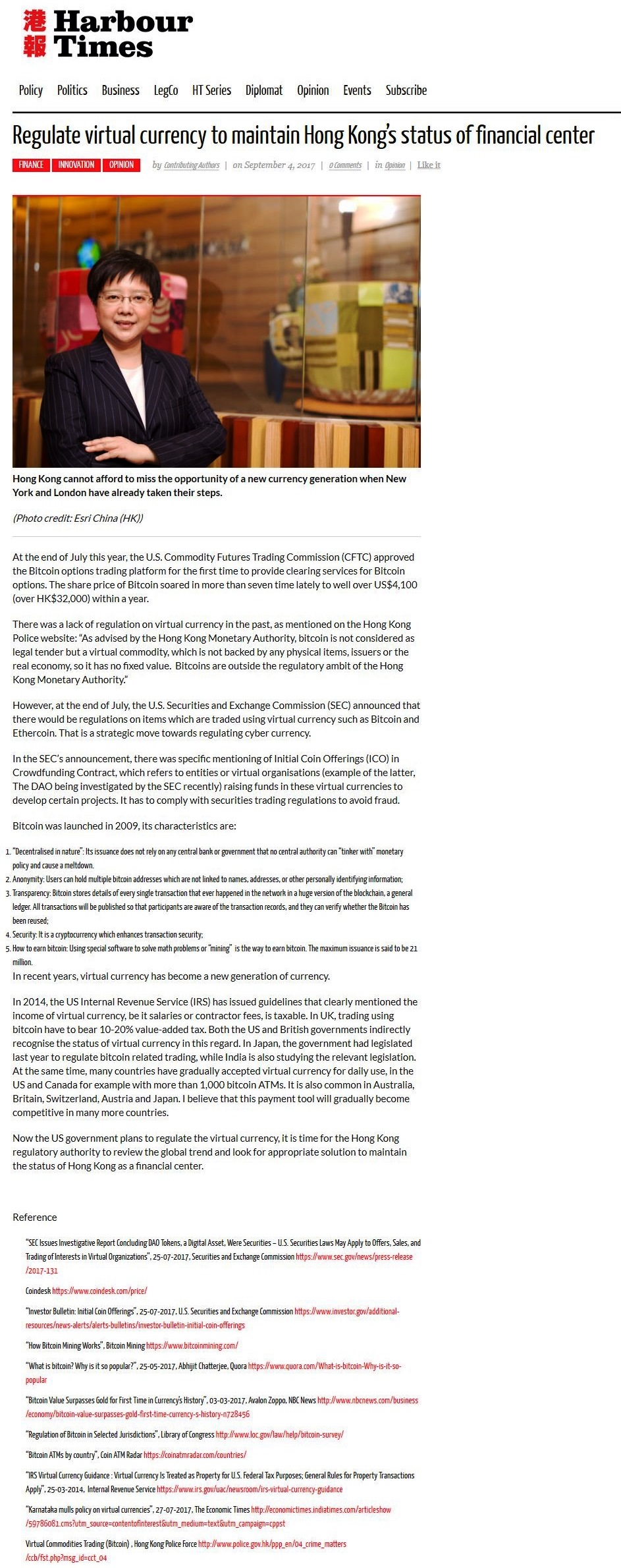網上版請按此

Regulate virtual currency to maintain Hong Kong's status of financial center
At the end of July this year, the U.S. Commodity Futures Trading Commission (CFTC) approved the Bitcoin options trading platform for the first time to provide clearing services for Bitcoin options. The share price of Bitcoin soared in more than seven time lately to well over US$4,100 (over HK$32,000) within a year.
There was a lack of regulation on virtual currency in the past, as mentioned on the Hong Kong Police website: "As advised by the Hong Kong Monetary Authority, bitcoin is not considered as legal tender but a virtual commodity, which is not backed by any physical items, issuers or the real economy, so it has no fixed value. Bitcoins are outside the regulatory ambit of the Hong Kong Monetary Authority."
However, at the end of July, the U.S. Securities and Exchange Commission (SEC) announced that there would be regulations on items which are traded using virtual currency such as Bitcoin and Ethercoin. That is a strategic move towards regulating cyber currency.
In the SEC's announcement, there was specific mentioning of Initial Coin Offerings (ICO) in Crowdfunding Contract, which refers to entities or virtual organisations (example of the latter, The DAO being investigated by the SEC recently) raising funds in these virtual currencies to develop certain projects. It has to comply with securities trading regulations to avoid fraud.
Bitcoin was launched in 2009, its characteristics are:
1 "Decentralised in nature": Its issuance does not rely on any central bank or government that no central authority can "tinker with" monetary policy and cause a meltdown;
2 Anonymity: Users can hold multiple bitcoin addresses which are not linked to names, addresses, or other personally identifying information;
3 Transparency: Bitcoin stores details of every single transaction that ever happened in the network in a huge version of the blockchain, a general ledger. All transactions will be published so that participants are aware of the transaction records, and they can verify whether the Bitcoin has been reused;
4 Security: It is a cryptocurrency which enhances transaction security;
5 How to earn bitcoin: Using special software to solve math problems or "mining" is the way to earn bitcoin. The maximum issuance is said to be 21 million.
In recent years, virtual currency has become a new generation of currency.
In 2014, the US Internal Revenue Service (IRS) has issued guidelines that clearly mentioned the income of virtual currency, be it salaries or contractor fees, is taxable. In UK, trading using bitcoin have to bear 10-20% value-added tax. Both the US and British governments indirectly recognise the status of virtual currency in this regard. In Japan, the government had legislated last year to regulate bitcoin related trading, while India is also studying the relevant legislation. At the same time, many countries have gradually accepted virtual currency for daily use, in the US and Canada for example with more than 1,000 bitcoin ATMs. It is also common in Australia, Britain, Switzerland, Austria and Japan. I believe that this payment tool will gradually become competitive in many more countries.
Now the US government plans to regulate the virtual currency, it is time for the Hong Kong regulatory authority to review the global trend and look for appropriate solution to maintain the status of Hong Kong as a financial center.
Dr. Winnie Tang
Honorary Professor, Department of Computer Science, The University of Hong Kong